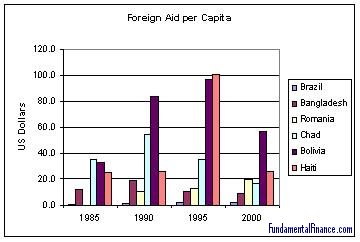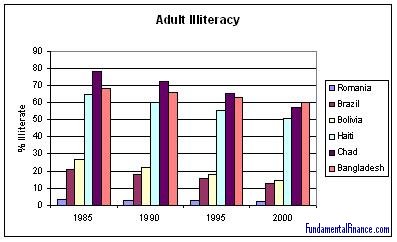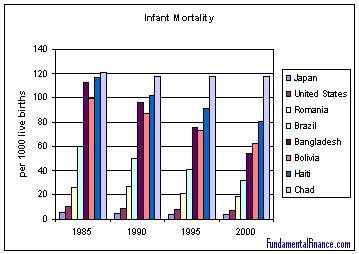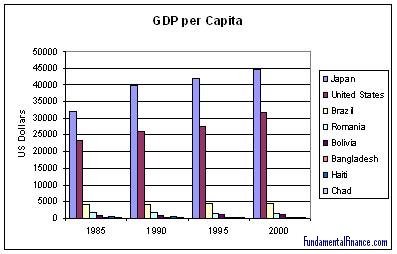Poverty and International Cooperation
by Blake Taylor
Many countries in today's international arena are impoverished, creating a common problem not only for these countries, but for all nations around the globe. Bolstering these less developed economies and establishing competent governments provides benefits for everyone--in trade, health, and peace; as a result, nations are currently cooperating to help these struggling countries escape from their destitute conditions.
Chad is an excellent example of recent international action. "The average Chadian can expect to die before his 45th birthday. The per capita income barely exceeds $1000 a year. Chad ranks 165th of 173 countries on the United Nations Human Development Index" (New York Times, Feb 18, 2004). Oil has recently been discovered there; hence NGO's are now investing in the nation so that they may extract it. The World Bank, an IGO, has partially financed the project and will oversee how the Chadian government uses the incoming revenues. Chad will receive its first share of profits this year, $100 million dollars, which will increase the government treasury by about forty percent. Although there are risks involved, the World Bank hopes that this money will be used to lift Chad out of its poverty. At the same time, countries around the world can benefit from oil earnings and a superior Chadian economy with which they can trade.
Chad is not alone in its distress. Across the Atlantic Haiti also lies in poverty--economically and politically. "Most of the eight million Haitians are without jobs or live on less than $1 [a] day..." (NYT, Feb 10, 2004). "Many people are sick with fever, malaria, pneumonia... many children are malnourished, and the rains wash down waste from villages upstream, bringing sickness and death" (Mar 14). This has led to recent events in which rebels seized the nation--many were "civilians frustrated by the deepening poverty" (Feb 10). Over the years other nations have offered assistance through institutions such as the United Nations World Food Program, which "now provides 373,000 Haitians with food" (Feb 25), but the recent political unrest has hampered efforts to distribute food and increasing security threats may result in food shortages.
Governments in less developed countries often impede efforts by international institutions to provide aid and help strengthen economies--thus inhibiting international cooperation. This trend can be seen in Chad, Haiti, and all over the world. "There once were many millions for Haiti from the World Bank, but the bank says the money bought almost nothing, and it says it will exercise 'extreme caution' before it resumes trying to help Haiti." "Now that [Aristide, the recently ousted president,] is gone, the United States Agency for International Development and the United Nations plan to spend millions more for Haiti--but there is a sense that it comes with the weariness attached to large-scale, long-running failure" (Mar. 14). The Haitian government has wasted the large sums of money it has received by investing "a lot of money in bureaucracy, cars and logistics, leaving nothing for the people" (NYT, Mar. 14). This is not due to non-cooperation by other countries--the Haitian government has been the problem while foreign countries have had good intentions. "In the end, the aid delivered to Haiti's government by the World Bank had 'no impact,' the World Bank concluded two years ago..." "The fundamental barrier to development in Haiti, and the reason so much international aid has failed, the World Bank says, has been two centuries of terrible government controlled by 'a small elite' that always monopolized money and power, and 'often used force to control the country'" (Mar. 14).
Romania, on the other hand, provides an example of successful governmental and international cooperation. "The country, which became infamous in 1990 for the squalid orphanages and babies dying of AIDS that marked the final years of Nicolae Ceausescu's dictatorship, is now being cited as a model of how governments, drug companies and international agencies can bring AIDS under control" (NYT, Feb.11, 2004). The Romanian government came up with a plan to fight AIDS and has been careful to employ it. After careful management of an increasing AIDS budget, they were granted $49 million from the Global Fund to Fight AIDS, Tuberculosis and Malaria. Romania's situation has improved tremendously, foreign nations have been able to sell them medication (at reduced prices), and the health threat to Romanians and foreigners has been reduced--benefiting all.
The attached addendum [1] shows various measures of poverty across selected developed and less developed countries from different continents between 1985 and 2000. "Foreign Aid per Capita" reflects assistance that international institutions have provided and countries which are in need of it. "Adult Illiteracy" indicates each government's success in educating its population--presumably a wealthier or more developed nation would have a lower illiteracy rate. "Infant Mortality" shows how each nation has improved health care over time and reveals the ability of a nation to care for its population. Finally, "GDP per Capita" is an excellent indicator of a nation's overall wealth. The graphs show a trend of decreasing poverty over time, a result of the growing international economy.
Nations are cooperating internationally through institutions such as the World Bank and the UN to aid impoverished countries even though unruly governments sometimes inhibit their progress. The cooperation is motivated by the economic benefits that growing economies will yield across the globe and the benefits that peace brings. Thus cooperation to resolve common problems is resulting in collective goods that are advantageous to all.
[1]




|
|